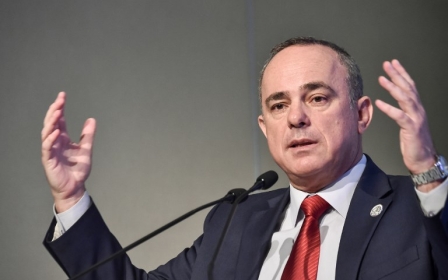Hundreds of US lawmakers urge maintaining Israel aid without conditions

Hundreds of lawmakers said in a letter on Thursday that US aid to Israel must continue without conditions or reduction, pushing back against a recently proposed bill that would ban American assistance from funding human rights abuses against Palestinians.
The letter, addressed to the chair of the House Appropriations Committee, Rosa DeLauro, and signed by 330 members, said the aid is necessary for Israel to defend itself from "persistent threats".
"Reducing funding or adding conditions on security assistance would be detrimental to Israel’s ability to defend itself against all threats," it said.
The statement was led by Michael McCaul, the top Republican on the House Foreign Affairs Committee, and Ted Deutsch, the Democratic chair of the subcommittee on the Middle East.
Beth Miller, government affairs manager at JVP Action, a political advocacy group linked to Jewish Voice for Peace, called the statement a "classic AIPAC letter", referring to the pro-Israel lobby, the American Israel Public Affairs Committee.
New MEE newsletter: Jerusalem Dispatch
Sign up to get the latest insights and analysis on Israel-Palestine, alongside Turkey Unpacked and other MEE newsletters
"It attempts to pretend that it should be US policy to just write a blank check for whatever Israel wants to do, and to pretend that Israel's oppression of Palestinians is somehow an act of self-defense, which is - of course - absurd," Miller told MEE.
Jewish Insider, which first revealed Thursday's letter, reported that it was backed by AIPAC during a virtual event last month.
The pro-Israel lobby has been intensely expressing opposition to a bill introduced earlier this month by Congresswoman Betty McCollum that would prohibit US assistance from being used to detain Palestinian children, demolish homes or annex Palestinian land.
Citing Biden and Obama
The Deutsch-McCaul letter did not mention Israeli policies against Palestinians. Instead, it portrayed Israel as a passive victim of grave threats, not a regional geopolitical player.
For example, the document cites a suspected Iranian attack on an Israeli-owned ship in the Gulf of Oman in February. However, it fails to note the ongoing mutual hostilities between the two countries, including sabotage operations against Iranian nuclear facilities blamed on Israel and a recent attack on an Iranian ship in the Red Sea.
The letter emphasises cementing the Barack Obama-era memorandum of understanding (MOU) that secured $3.8bn in annual aid to Israel over 10 years starting in 2016. It also highlights a previous statement by President Joe Biden where he calls imposing conditions on aid to Israel "irresponsible".
Yousef Munayyer, a Palestinian-American analyst who is a non-resident fellow at the Arab Center Washington DC, said the letter invokes Democratic leaders to "navigate a very clear partisan divide" where AIPAC is losing traction amongst Democrats.
Earlier this week, top progressive senators Elizabeth Warren and Bernie Sanders called for conditioning aid to Israel, and a recent Gallup poll showed that 53 percent of Democratic respondents favour applying more pressure to Israel.
'We believe that our military funding should not ever be used for human rights violations, full stop, anywhere'
- Beth Miller, JVP Action
Although 330 members sound like a huge number, Munayyer said, the fact that more than 100 legislators in the House did not sign the document signals that some lawmakers are starting to scrutinise the previously unquestioned issue of aid to Israel.
Munayyer called security assistance the "holy grail" of the US-Israel relationship.
"The fact that AIPAC feels that it needs to actually put resources and muscle into a debate around military finance for Israel is a pretty significant shift. And that should not be lost on anyone," he told MEE.
Munayyer dismissed the argument that conditioning aid to Israel would put it in serious danger, underscoring that the country is the largest arms exporter in the world per capita.
"The Israelis are in a tremendous position of strength vis-a-vis the Palestinians and others in the region," he said.
"So this is not about Israel's ability to defend itself. It's about whether or not the United States is going to continue to provide a blank check for every single Israeli human rights abuse against Palestinians."
Who signed, who didn't?
With 330 out of 435 House members backing the letter, it is easier to count those who did not sign.
Most of the top legislators from both major parties added their names to the letter.
But there are notable absences. Gregory Meeks, the chair of the House Foreign Affairs Committee who is a staunch Israel supporter, did not sign on. Neither did Jim Clyburn, the powerful House Majority Whip.
Progressives, including all 13 co-sponsors of McCollum's bill, did not put their name on the statement. Pramila Jayapal, chair of the Congressional Progressive Caucus, and Katie Porter, a prominent California progressive, did not back it either.
It is not clear if all the members who did not sign the document were approached to sign it, or whether the absence of their names signals opposition to its content.
Many left-leaning House members, like Ro Khanna - a former co-chair of Bernie Sanders' presidential campaign - signed on to the letter.
Khanna has been advocating a more progressive foreign policy, including ending Washington's role in the war in Yemen and restoring the Iran nuclear deal.
Julia Albertson, a spokeswoman for Khanna's office, said the congressman supports existing provisions in US law that prohibits American aid from being used in human rights violations.
"Rep. Khanna supports the full provision of $3.8 billion in aid to Israel annually under the MOU, and does not support conditioning the provision of that full amount of aid - a position articulated in this letter," Albertson told MEE in a statement.
"At the same time, as highlighted by the letter Rep. Khanna led last year against Israeli home demolitions, he strongly supports robust enforcement of the Leahy Law, the Arms Export Control Act, and other existing restrictions on all foreign assistance, to prevent US taxpayer dollars from being used for perpetuating human rights violations."
These regulations have never been applied to US aid to Israel.
Thursday's letter was also endorsed by Tom Malinowski, a New Jersey Democrat, who has been outspoken about human rights abuses in other places in the Middle East, including Egypt and Saudi Arabia. Malinowski's office did not respond to MEE's request for comment.
Miller, of JVP Action, lambasted "self-identified progressives" who backed the letter, naming Khanna and Michigan Democrat Andy Levin amongst others.
"This letter is entirely about writing a blank check to the Israeli government to do whatever it wants to do," Miller told MEE.
"That is entirely out of line with progressive values. We believe that our military funding should not ever be used for human rights violations, full stop, anywhere."
Middle East Eye delivers independent and unrivalled coverage and analysis of the Middle East, North Africa and beyond. To learn more about republishing this content and the associated fees, please fill out this form. More about MEE can be found here.





